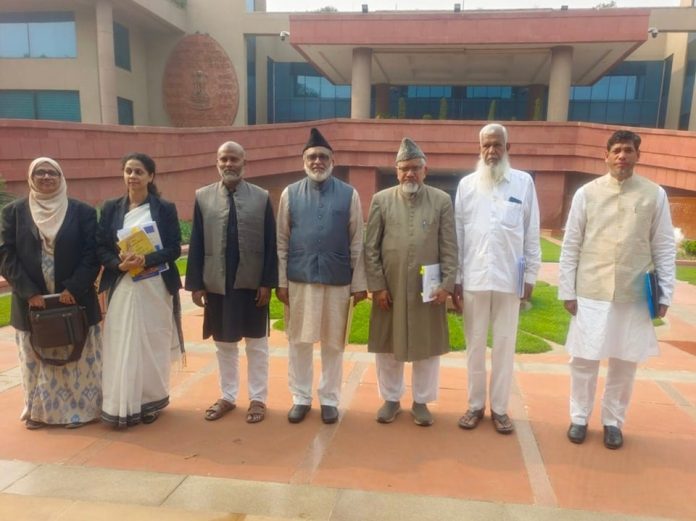New Delhi: A delegation from Jamaat-e-Islami Hind led by Vice President Malik Motasim Khan, presented its concerns on the Waqf (Amendment) Bill 2024 to the Joint Parliamentary Committee (JPC) on Monday. During the meeting, the delegation delivered a detailed presentation, highlighting important issues and potential problems associated with the proposed bill.
On his return from JPC meeting, JIH Vice President Malik Motasim Khan shared with Radiance, “Our stance has been clear since the bill was introduced in Parliament and subsequently brought before the JPC. We have expressed our concerns individually and in groups to MPs from various political parties, especially those like TDP and JDU, who hold secular principles that could positively influence the bill’s consideration. While many listened and responded positively, it remains uncertain how they will ultimately vote on this issue in the next Parliamentary session.”
He added, “We are reaching out to all stakeholders who can make a difference on this matter. When the JPC was constituted, we requested the Chairman to allow us a thorough presentation on the bill. Although we cannot disclose specific details of the JPC meeting, we reiterated our position, as we have in press conferences and in discussions with party representatives.”
He explained, “Amendments should ideally enhance the effectiveness and benefits of the existing Act. If the amendments genuinely aim to reform, they would be welcome. However, if they restrict the Waqf Board’s powers, alter its core structure, seize Waqf land, or curtail the Muslim community’s role, we cannot support them.”
Khan also noted that the bill, initially promoted as the United Waqf Management, Empowerment, Efficiency, and Development (UMEED) Bill 2024, had diverged significantly from its stated goals. “The current Waqf framework has evolved over 100 years, and any new changes should build upon past reforms to serve the community better. A new committee should consider beneficial aspects of all prior amendments to truly fulfil the Waqf’s purpose,” he stated.
Prof. Salim Engineer, another JIH Vice President and delegation member, voiced further concerns: “The proposed amendments fundamentally redefine the Waqf, undermining the Waqf system as a whole. Waqf is a constitutional right, like other rights in our Constitution, yet these amendments risk infringing upon those rights and marginalising the community’s role.”
He warned, “If passed, this bill could lead to disputes, increased litigation, and embolden encroachers. The nature of the bill is such that minor adjustments won’t suffice; it should be rejected entirely. This is the position of JIH and all other major Muslim organisations.”
JIH’s Waqf Department head, Assistant Secretary Inamur Rehman, stated that the delegation effectively communicated their concerns, and the JPC appeared receptive.
The delegation included National Secretaries Md. Abdur Rafeeq and Rahmathunnisa A, OBC leader Ansari Shabbir Ahmad, and Advocates Nizam Pasha and Zeba Khair.




